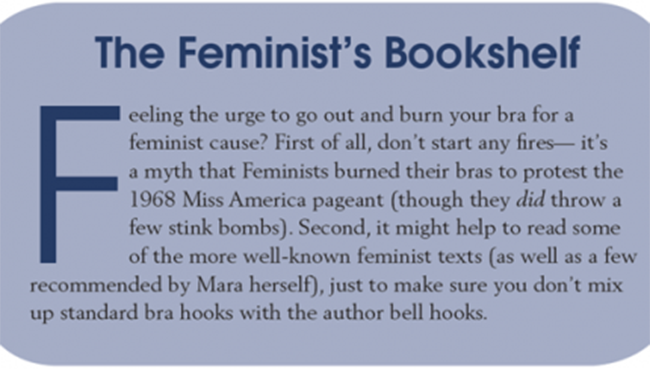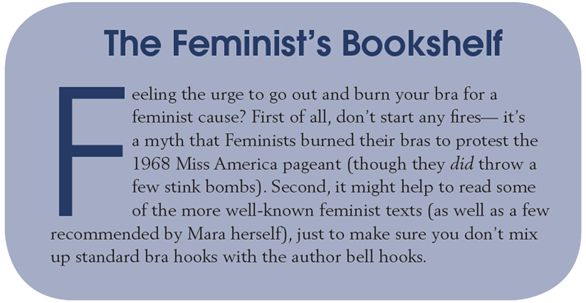Story by Brit McGinnis
Photo by Allison Fonder
Who are Feminists? Stately ladies in black dresses declaring that they deserve the right to vote? Young men challenging their classmates to speak out against sexual assault? They’re both, and many more types of folks too. One thing’s for sure though: what it means to be a Feminist in the twenty-first century is changing, which can be very confusing. Mara Williams, M.A., doctoral student, and lifelong Feminist, serves as our guide through the world of this political and ideological movement.
Brit McGinnis: How long have you considered yourself a Feminist?
Mara Williams: Very, very long, actually. The first time I remember verbalizing my feminism was probably around age 11 or so.
The place that I grew up was a fairly well-off sort of suburban community in California. I remember getting into fights like in Sunday school about reproductive rights and women working. Your standard liberal feminist issues. I thought of myself as a champion of women
BM: Back then, did you read The Second Sex or any of the ‘standard’ readings?
MW: I really didn’t, actually. I think that most of my introduction to feminism was through my mom and my aunts. It was sort of in the air.
BM: Do you think that such literature is going to be relevant in the future?
MW: I think it can be. I think it has to be put in a lot of context because a lot of it has to do with race and class. That idea of the sort of suburban housewife whose life choices have been really, really constrained, and then she kind of wakes up and sees the world for the limited choices that she has … it’s really specific to a time, a place, and a racial and class position. I think literature can be helpful, but part of the thing is that we’re not in that same place. And so I think it is more helpful as historical context, and a sort of [way to] put yourself in this place and see what it feels like. But as a statement about the enduring condition of women, maybe not.
Personally, I love reading manifestos. That’s the genre of feminist writing that I really enjoy. It’s hardcore, like, ‘We’re gonna set out what our goal is here.’ They’re usually attached to times and places. You can see where those things come out of, and then use them to think about where you are in the moment that you’re in.
BM: What do you think are going to be the issues of the future for the new Feminists that are coming of age?
MW: I think work is a huge one. Like the economy, the way that it is, and access to well-paying jobs with benefits. It’s a feminist issue, but it’s an issue that everyone has to deal with. How is work organized? What kinds of power do you have in your job? Do you have a job?
I think environmental justice is also huge, but with an eye to how those issues affect people according to race, class, and gender. Where is the air clean and where is it not? Also food issues, and not just access to organic, but access to food, access to having enough to eat, is a feminist issue.
BM: Do you think that globalization is going to change the face of feminism?
MW: Feminism already is globalized. Not all Feminists know that yet, but you can’t talk about feminism without talking about globalized feminisms. There’s a kind of white liberal feminism that is still really strong on college campuses, but there are a lot of other kinds of feminisms. [They] have different intellectual histories and different activist histories, and they have been doing incredible work on gender inequality.
BM: Zines [hand-made magazines] have received a lot of press as being the new symbol of feminism. Why do you think the zine has exploded in this way?
MW: I think what’s cool about zines is that [they let] people express themselves in such a low-tech way. It’s really reproducible; it’s cheap; it’s fun. There’s a mix of genres within the zine that I think is really helpful when you’re looking to describe either your own activist work or a certain political moment because nothing is simple. And so what a zine does is let you bring in different perspectives. I think that making your own media, if you haven’t done it before, is a profoundly empowering experience. I think [the zine is] a great place to do activism, and to figure out how you view the world.
And just to note something else—I don’t think you need to own the Feminist label to do feminist work. Feminism has been painted as this man-hating, anti-heterosexual, anti-family thing, and it’s not. You can line up Feminist after Feminist and say, ‘Here’s a heterosexual Feminist. Here’s a Feminist who likes to wear skirts.’ The discourse that feminism is unattractive is still really powerful. For me, I don’t care if you call yourself a Feminist or not—I care what kind of work you do. If you’re doing the work that helps reduce gender inequalities and gets more people who have been oppressed more access to resources and to power, I don’t care if you call yourself a Feminist.
BM: Does it worry you that feminism still carries that stereotype?
MW: It does! [Marginalizing Feminists] is a really politically effective tool. Feminists are, like any other group, so diverse. It’s really hard to make blanket statements beyond, ‘We’re all working [on] gender inequalities.’ But I think the stereotype is a way to flatten that difference and to flatten that diversity. [The stereotype] makes it harder to do this work, and it makes it seem unnatural to do this work. If we can expose the workings of those statements, I think we can maybe change them.
BM: Are you optimistic about changing that label?
MW: I think I am, but I’m not as attached to the label as some people are. So I’m optimistic about the future of activist and academic work on gender and power. And I’m optimistic about the future of feminism to be relevant for coming generations. I think that people in the future might surprise us as far as how they interpret feminism, or what they make it do for them. I want to see what happens, and where it goes.









